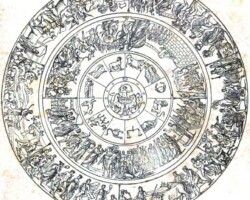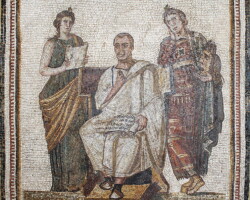Justice
 Definition and Explanation
Definition and Explanation
- Catechism of the Catholic Church, point 1807:
- "Justice is the moral virtue that consists in the constant and firm will to give their due to God and neighbor."
- Thomas Aquinas' Summa Theologiae, IIaIIae, question 58:
- Justice is a habit whereby a man renders to each one his due by a constant and perpetual will.
- Justice perfects the rational appetite, also called "the will."
- Aristotle's Rhetoric, Book I, Chapter 9:
- "Justice is the virtue through which everybody enjoys his own possessions in accordance with the law."
Examples from Western History and Literature

Eumaios to Odysseus
“The blessed gods have no love for a pitiless action, but rather they reward justice and what men do…

The Shield of Achilles
On it he wrought in all their beauty two cities of mortal Men. And there were marriages in one, and …

Aeneas and Turnus
The man [Turnus] brought down, brought low, lifted his eyes / And held his right hand out to make hi…

Cicero about Caesar
Cicero says that Caesar “undermined all laws, divine and human, in order to establish that dominance…


